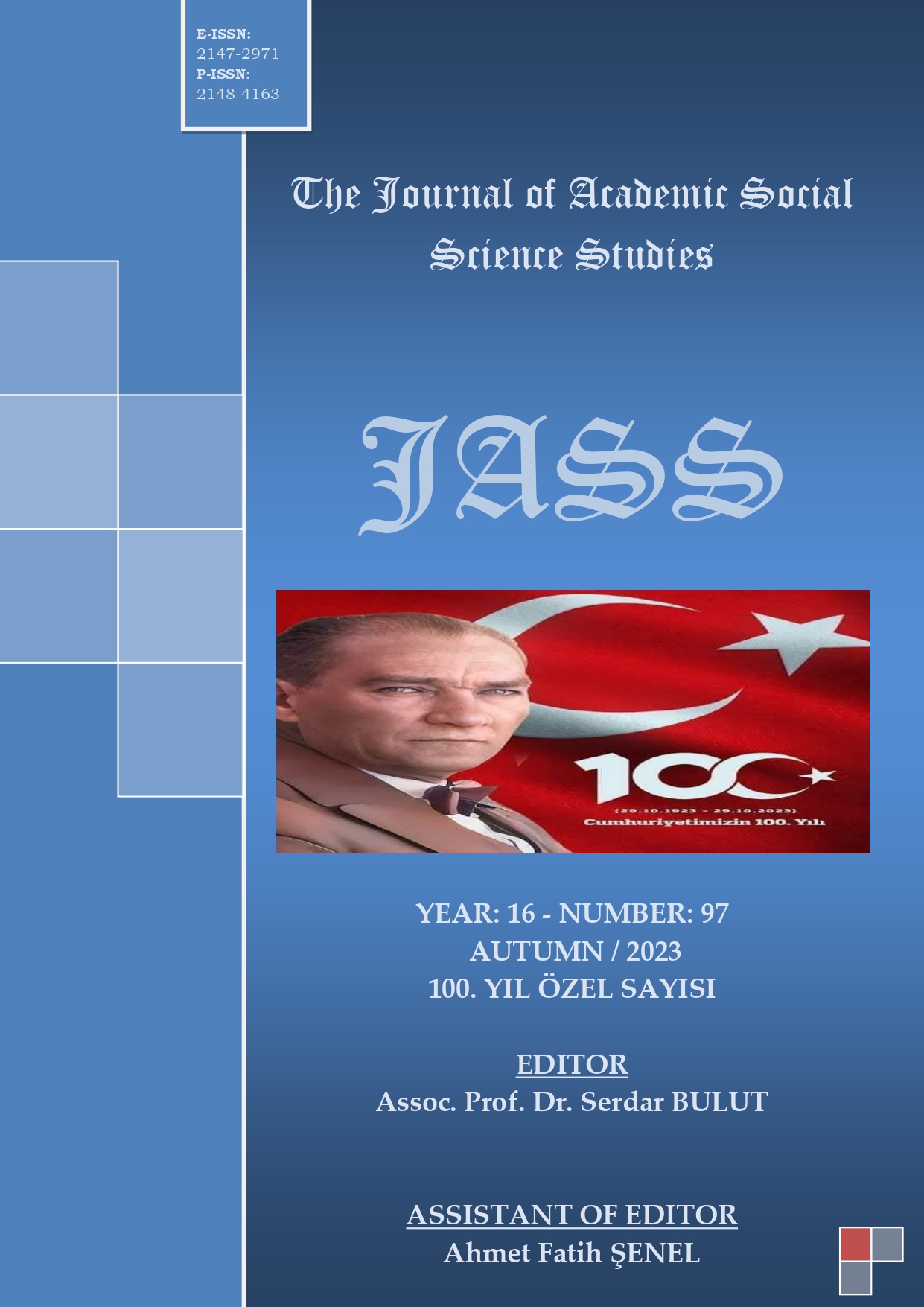ÇEVRE EĞİTİMİ VE İKLİM DEĞİŞİKLİĞİ DERSİ (6, 7 VEYA 8. SINIFLAR) ÖĞRETİM PROGRAMI KAZANIMLARININ YENİLENMİŞ BLOOM TAKSONOMİSİ BİLİŞSEL ALAN BASAMAKLARINA GÖRE DEĞERLENDİRİLMESİ
Author :
Abstract
Araştırmanın amacı, Çevre Eğitimi ve İklim Değişikliği Dersi (6, 7 veya 8. Sınıflar) öğretim programı kazanımlarının yenilenmiş Bloom taksonomisine göre ünitelere dağılışını-düzeyini belirlemektir. Çalışmada doküman incelemesi yöntemi kullanılmıştır. Çalışma çerçevesinde sözü edilen programdaki 34 kazanım irdelenmiştir. Araştırmanın güvenirlilik katsayısı 0.85’tir. Analiz bulgularına göre İnsan ve Doğa ünitesi kazanımlarının dördü kavramsal ikisi işlemsel; Döngüsel Doğa ünitesi kazanımlarının ikisi kavramsal ikisi işlemsel bilgiye yöneliktir. Çevre Sorunları ünitesi kazanımlarının tamamı (6) kavramsal bilgi düzeyindedir. Küresel İklim Değişikliği ünitesinde bir kazanım olgusal, dört kazanım kavramsal bilgiden oluşmaktadır. İklim Değişikliği ve Türkiye ünitesi kazanımlarının ikisi kavramsal, ikisi işlemsel biri ise üst bilişsel bilgi boyutundadır. Sürdürülebilir Kalkınma ve Çevre Dostu Teknolojiler ünitesi kazanımlarının beşi kavramsal, ikisi işlemsel, biri ise üst bilişsel bilgi düzeyindedir. Programda yer alan kazanımların %68’i kavramsal (23 kazanım), %23’ü işlemsel (8 kazanım), %6’sı üst bilişsel (2 kazanım) ve %3’ü olgusal (1 kazanım) bilgiden oluşmaktadır. Öğretim programında olgusal ve üst bilişsel bilgi basamağına az yer verilmesi dikkat çekicidir. Bilişsel süreç açısından kazanımların anlama basamağında toplandığı görülmektedir. Kazanımların %59’u anlama (20 kazanım), %29’u (10 kazanım) çözümleme, %12’si (4 kazanım) yaratma düzeyindedir. Programda hatırlama, uygulama ve değerlendirme düzeylerinde kazanımlara yer verilmemiştir. İnsan ve Doğa ünitesinde yer alan altı kazanımdan ikisi anlama, üçü çözümleme ve biri yaratma; Döngüsel Dünya ünitesinde ise dört kazanımın biri anlama ve üçü çözümleme seviyesindedir. Çevre Sorunları ünitesinde, anlama düzeyinde beş, çözümleme düzeyinde bir kazanım vardır. Küresel İklim Değişikliği ünitesi kazanımlarının dördü anlama ve birisi de çözümleme seviyesindedir. İklim Değişikliği ve Türkiye ünitesinin üçü anlama, biri çözümleme ve birisi de yaratma; Sürdürülebilir Kalkınma ve Çevre Dostu Teknolojiler ünitesinin beşi anlama, biri çözümleme ve ikisi de yaratma bilişsel süreç boyutunda yer almaktadır. Sonuç olarak Çevre Eğitimi ve İklim Değişikliği Dersi (6, 7 veya 8. Sınıflar) öğretim programı kazanımları homojen bir dağılış göstermemekle birlikte üst bilişsel bilgi (%6) ve yaratma (%12) süreç boyutlarıyla ilgili kazanımların yetersiz olması dikkat çekicidir. Ancak bilgi basamağı bakımından işlemsel bilgi kazanımlarının %23’lük, bilişsel açıdan ise çözümleme basamağının %30’luk bir orana sahip olması programın üstün yanlarını ifade etmektedir. Programda, öğrencilerin daha çok zihinsel etkinliklerde bulunmasını sağlayıcı üst düzey bilgi-bilişsel süreç basamaklarına yer verilmesi olumlu olacaktır. Öğretmenlere kendilerini geliştirmelerine olanak sağlayan hizmet içi eğitimleri sunulmalı ve onlara kılavuzluk yapacak bir kitapçık hazırlanmalıdır. Araştırmanın sonraki süreçte yapılacak çalışmalara katkı sağlaması temennimizdir.
Keywords
Abstract
The aim of the research is to determine the distribution level of the curriculum achievements of the Environmental Education and Climate Change Course (6, 7 or 8th Grades) according to the renewed Bloom taxonomy. The document analysis method was used in the research. Within the framework of the research, 34 achievements in the mentioned program were examined. The reliability coefficient of the study is 0.85. According to the analysis findings, four conceptual and two operational outcomes of the Human and Nature unit are; two of the achievements of the Cyclic Nature unit are conceptual and two are procedural knowledge. All of the achievements of the Environmental Problems unit (6) are at the level of conceptual knowledge. In the Global Climate Change unit, one outcome consists of factual knowledge and four acquisitions consist of conceptual knowledge. Two of the Climate Change and Turkey unit achievements are conceptual, two are operational and one is metacognitive knowledge. Five of the achievements of the Sustainable Development and Environmentally Friendly Technologies unit are at the conceptual level, two at the operational level, and one at the metacognitive level. 68% of the learning outcomes in the program are conceptual (23 outcomes), 23% are operational (8 outcomes), 6% are metacognitive (2 outcomes) and 3% are factual (1 outcome). It is remarkable that factual and metacognitive knowledge level is given little place in the curriculum. In the cognitive process dimension, the gains are concentrated at the level of understanding. 59% of the learning outcomes are at the level of understanding (20 outcomes), 29% (10 outcomes) at the level of analysis, and 12% (4 outcomes) at the level of creation. The program did not include achievements at the levels of remembering, application and evaluation. Two of the six achievements in the Human and Nature unit are understanding, three are analysis and one is creation; In the Circular World unit, one of the four outcomes is at the level of understanding and three at the level of analysis. In the Environmental Problems unit, there are five gains at the level of understanding and one at the level of analysis. Four of the Global Climate Change unit's achievements are at the level of understanding and one at the level of analysis. The Climate Change and Turkey unit consist of three understanding, one analysis and one creation; Five of the Sustainable Development and Environmentally Friendly Technologies unit are in the cognitive process dimension of understanding, one of analysis, and two of them. As a result, although the curriculum achievements of Environmental Education and Climate Change (6, 7 or 8th Grades) do not show a homogeneous distribution, it is seen that the acquisitions related to metacognitive knowledge (6%) and creation (12%) process dimensions are insufficient. However, the fact that the procedural knowledge gains have a rate of 23% in terms of knowledge dimension and 30% of the analysis step in terms of cognitive process dimension expresses the superior aspects of the program. In the program, it would be appropriate to include higher-level knowledge and cognitive process steps that enable students to engage in more mental activities. In-service training should be provided to the teachers allows them to train themselves and a booklet should be prepared to guide them. We hope that the research will contribute to future studies.
